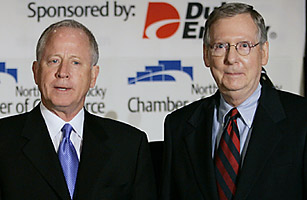
Republican U. S. Sen. Mitch McConnell, right, and Democratic challenger Bruce Lunsford appear together prior to a debate in Erlanger, Ky.
(2 of 2)
But no longer. McConnell — who is known for his bare-knuckle approach to politics — is fighting as hard as he ever has to hold onto his Senate seat. In recent days, the Republican leader has stepped up his assault against Lunsford with a line of attack that has echoes of 2003. McConnell's ads have featured veterans complaining about the care they got at Valor Healthcare, a company where Lunsford once served as CEO and where he still sits on the board of directors. In defense, Lunsford has produced testimonials of praise for the company's clinics.
He also enlisted two of the Democratic Party's most prominent disabled veterans. Former Georgia Senator Max Cleland, a triple amputee, campaigned with Lunsford last weekend at a VFW post in Frankfort, where he declared: "This whole attack on Bruce in terms of veterans' issues is a cover-up. It's a distraction from the fact that Kentuckians are hurting. They are suffering. They are hurting for jobs." Former Nebraska Senator Bob Kerrey, a Congressional Medal of Honor winner who lost a leg in Vietnam, is set to appear with Lunsford this weekend.
McConnell also is reminding Kentucky voters of all the pork he has delivered as a member of the Senate Appropriations Committee — $500 million in the past year alone, he claims. That message, however, is sharply discordant with the top of the ticket, where John McCain is running on a promise to eradicate exactly those kinds of "earmarks." Lunsford, ironically, is the one who sounds more like McCain on this particular issue, saying that the federal projects that McConnell has delivered are "chump change" compared to the cost that Washington's insider culture has exacted on the state. He also is reminding voters of the role that McConnell has played in shepherding George Bush's economic agenda in the Senate, calling McConnell the President's "henchman."
Political handicappers still give McConnell the edge for re-election. But his race has become a symbol of the difficulties that confront Republicans up and down the ballot. And it's proof that in some election years, even a safe bet can suddenly turn risky.